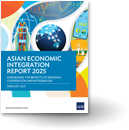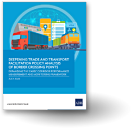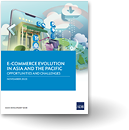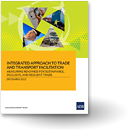Cross-border Infrastructure
Association of Southeast Asian Nations (ASEAN) cooperation on transport, telecommunication, energy, and customs
The Association of Southeast Asian Nations (ASEAN) was established on 8 August 1967 in Bangkok, Thailand. Current ASEAN members include Brunei Darussalam, Cambodia, Indonesia, Lao People’s Democratic Republic (Lao PDR), Malaysia, Myanmar, the Philippines, Singapore, Thailand, and Viet Nam. Infrastructure is essential to provide the necessary transport linkages and logistics in support of the establishment of a single market and production base under the ASEAN Economic Community (AEC). The Fifth ASEAN Transport Ministers Meeting on 15-16 September 1999 in Hanoi, Viet Nam signed a Ministerial Understanding on the Development of the ASEAN Highway Network Project. The Tenth ASEAN Transport Ministers on 23 November 2004 in Phnom Penh, Cambodia endorsed the ASEAN Transport Action Plan 2005-2010 which provides the basis for broadening and deepening cooperation in the ASEAN transport sector.
With the assistance of the Asian Development Bank, ASEAN is formulating a five-year ASEAN Road Safety Action Plan, an ASEAN Intelligent Transport System (ITS) Policy Framework, and an ASEAN highway numbering system of three numeric designations.
Leaders at the Tenth ASEAN Summit in Vientiane, Lao PDR, under the Vientiane Action Programme 2004-2010, called for accelerating the progressive integration of the e-ASEAN sector by 2010. The Fifth ASEAN Telecommunications and Information Technology Ministers (TELMIN) on 27 September 2005 in Hanoi adopted the Ha Noi Agenda on Promoting Online Services and Applications to Realize e-ASEAN.
ASEAN member countries signed an Agreement on the ASEAN Energy Cooperation in 1986 to ensure and develop sources of energy in strengthening the economic resilience of the Member Countries. The ASEAN Ministers on Energy Meeting (AMEM), held in Langkawi in July 2003, called for intensified cooperation in the development and exploitation of the energy resource potentials in the ASEAN region, as well as in attracting private sector participation and investment in the ASEAN energy sector. The Ministers agreed to work collectively in moving forward the Trans-ASEAN Gas Pipeline (TAGP) and the ASEAN Power Grid projects to provide greater stability and security of energy supply in the ASEAN region. The ASEAN Centre for Energy (ACE), established in 1999, serves a key role in facilitating regional energy programs and activities to implement the ASEAN Plan of Action for Energy Cooperation (APAEC) 2004-2009.
Member countries committed to facilitate intra-ASEAN trade by simplifying and harmonizing trade procedures and enhancing regional cooperation in customs. The ASEAN Directors-General of Customs signed an ASEAN Customs Code of Conduct in 1983. The ASEAN Agreement on Customs was signed in 1997, providing a legal framework for ASEAN customs cooperation.
Agreements
- Nineteenth ASEAN Transport Ministers Meeting Joint Ministerial StatementAssociation of Southeast Asian Nations (ASEAN) Secretariat20 Dec 2013
- Sixteenth Meeting of ASEAN Tourism MinistersAssociation of Southeast Asian Nations (ASEAN) Secretariat20 Jan 2013
- Protocol to Implement the Sixth Package of Commitments on Air Transport Services under the ASEAN Framework Agreement on ServicesAssociation of Southeast Asian Nations (ASEAN) Secretariat10 Dec 2009
- Joint Ministerial Statement of the 15th ASEAN Transport Ministers Meeting Association of Southeast Asian Nations (ASEAN) Secretariat10 Dec 2009
- ASEAN Framework Agreement on the Facilitation of Inter-State TransportAssociation of Southeast Asian Nations (ASEAN) Secretariat10 Dec 2009
News
- ASEAN travel exchange in Cebu[, Philippines] yields P1.4 billion in initial sales leadsSun Star12 Feb 2026
- Cambodia, [Viet Nam, Lao People's Democratic Republic] leaders promote regional peace, stabilityAsia News Network9 Feb 2026
- Singapore to introduce new passenger transport to IndonesiaBorneo Bulletin9 Feb 2026
- ASEAN Power Grid: Accelerating the region’s energy transitionBusiness Ghana3 Feb 2026
Opinions and Editorials
- Cambodia: Vietnamese association pledges stronger cooperation to boost tourist flowsKhmer Times6 Sep 2025
- Malaysia's ASEAN Chairmanship charts a more resilient and integrated futureThe Edge19 Feb 2025
- Bridging disparities to bolster digital transformation in ASEANThe Jakarta Post4 Oct 2023
- Ties that bind: BIMP-EAGA and IMT-GT are vital building blocks for ASEANAsian Development Bank11 May 2023
Studies and Research
- Energy Efficiency in ASEAN: Trends and Financing SchemesY. Liu and R. NoorAsian Development Bank Institute27 Oct 2020
- ASEAN Vision 2040 Volume IV : Integrated and Connected Seamless ASEAN Economic CommunityP. S. Intal, Jr. and M. PangestuEconomic Research Institute for ASEAN and East Asia31 May 2019
- Firing Up Regional Brain Networks: The Promise of Brain Circulation in the ASEAN Economic CommunityJ. Batalova, A. Shymonyak, and G. SugiyartoAsian Development Bank1 Feb 2017
- A Review on Institutional Framework, Principles, and Key Elements for Integrated Electricity Market: Implications for ASEANT. F. Rakhmah and Y. LiEconomic Research Institute for ASEAN and East Asia1 Oct 2016
Meetings
- ASEAN Tourism Forum (ATF) 2014Association of Southeast Asian Nations (ASEAN) Secretariat16 Jan 2014
- ASEAN Foreign Ministers' RetreatAssociation of Southeast Asian Nations (ASEAN) Secretariat15 Jan 2014
- 45th ASEAN Economic Ministers' Meeting + External PartnersAssociation of Southeast Asian Nations (ASEAN) Secretariat20 Aug 2013
- ASEAN Day CelebrationAssociation of Southeast Asian Nations (ASEAN) Secretariat7 Aug 2013




